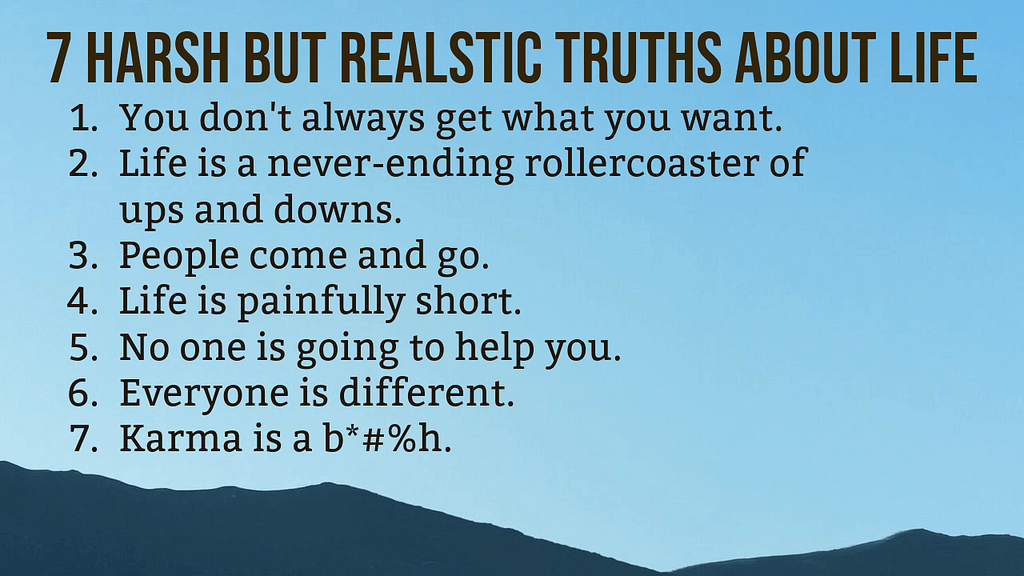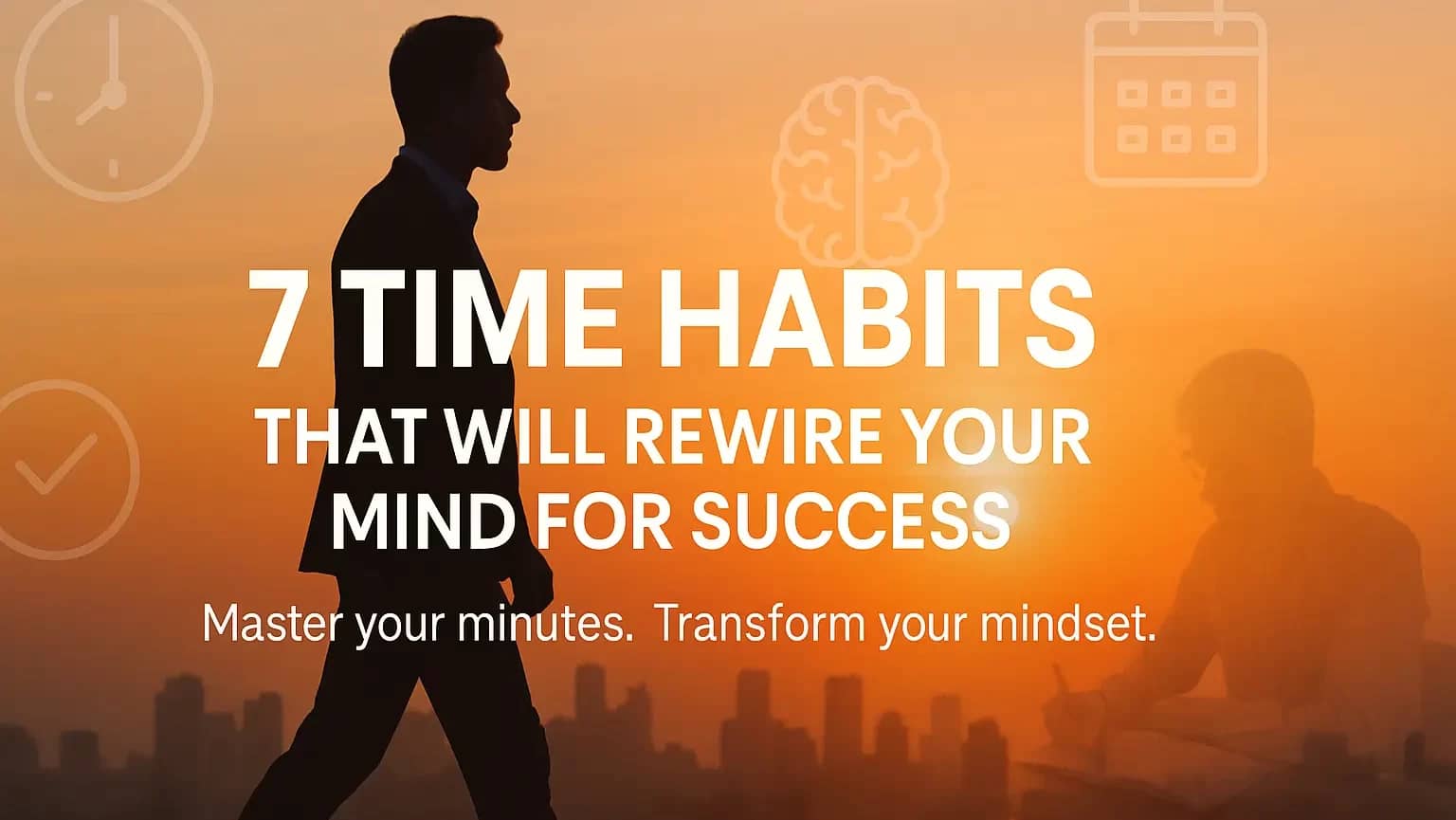What are some hard truths about life you have always struggled to accept? One of those was understanding the purpose behind my parents’ tough love and strict parenting style.
I’ll never forget one particular night. I had misbehaved, and as punishment, my dad locked me outside the house in the freezing cold of November. Sitting there—angry, confused, and filled with resentment—all I could think about was how much I wanted to grow up, move out, and live on my terms. I wanted total freedom and hated someone telling me what to do.

I carried that mindset for years, but as I grew older, I began to accept the harsh truth. Life is not always sunshine and rainbows, and we can quickly become irresponsible when we have too much freedom. Their discipline was not about control—it taught me that our decisions carry immense consequences that we can not always avoid.
We all face challenging realities about life that aren’t easy to accept. Yet, the sooner we confront these truths, the more empowered we become to make decisions that align with our purpose and add true meaning.
In this article, we’ll explore seven of life’s harshest truths and, more importantly, practical steps to help you embrace them. Let’s dive in!
1. You don’t always get what you want
We all want that dream job, car, home, or marriage, but it’s not always guaranteed. There are several different factors, some that are entirely out of our control, that determine whether we’ll receive the things we’ve always dreamed of. Our genetics, environment growing up, and parents’ financial situation are some factors that play a significant role in getting the things we want, yet are out of our control.
Despite the hard truth that nothing in life is guaranteed, there is a purpose behind this. When we do not have what we want, we learn to be grateful for what we do have. This gratitude shifts our perspective, helping us cherish the small things we currently have and allowing us to appreciate the greater blessings we’ll receive in the future.
Not having what we want teaches us how to better adapt to adversity, learn from our mistakes, and work to achieve our goals. Although living without the things you want isn’t easy, here are some practical steps you can take to accept this one of many harsh truths about life:
- Write down a list of your wants (not to confuse this with your needs).
- On that same page, write down a list of the things you already have.
- Compare your wants with the things you have now.
- Write down 3 or more reasons why you’re grateful for things you already have.
2. Life is just a rollercoaster that never ends
Life is like a rollercoaster—filled with highs and lows throughout the journey. When you’re at the very peak, you’ll suddenly fall to the trough of that curve. One day, the weather is sunny and warm. But the next day, it’s cold, bitter, and rainy, reminding you of life’s unpredictable behavior.
While happiness doesn’t last forever, neither does sadness. Similar to how we are bound to failure, we’re also bound to success. Life moves in an up-and-down pattern, reminding us that nothing is permanent. With this in mind, we learn to better embrace the unpredictability of life by starting to expect the unexpected.

Navigating through life’s unforeseen ups and downs isn’t easy, but doing so helps shape our character. Without ever experiencing the losses and setbacks, we can never truly treasure the victories and wins.
Through self-reflection, we can tailor our decision-making to best navigate through the highs and lows of life. Some areas to practice self-reflection include:
- Reflect on the current stage of your life (age, occupation, education).
- Reflect on some of the challenges and setbacks you’ve faced.
- Identify what you’ve learned from these challenges.
- Reflect on the successes and victories you’ve experienced in life.
- Identify what led you towards that success.
3. People come and go
“Do not make friends with a hot-tempered person, do not associate with one easily angered, or you may learn their ways and get yourself ensnared.”
-Proverbs 22:24-25
In this verse, Solomon highlights one of the common pitfalls in life: the people we surround ourselves with. When we surround ourselves with negative people, we risk absorbing that same energy and becoming a source of negativity ourselves. As a result, it is better to distance ourselves from those who don’t align with our values, despite how difficult letting may be.
Humans are creatures of change; we adapt, grow, and evolve based on our environment. The change we experience means we may have to depart from close ones, or close ones will depart from us. While these shifts can be challenging, they’re significant to our growth and transformation.

Everyone we encounter—whether friends, coworkers, or family members—has a purpose. When their path no longer aligns with ours, it’s often a natural part of life for them to leave. There may also be factors beyond our control, such as illness or relocation, that can cause those close to us to move on. While these changes can be painful, they remind us that people come into our lives for different reasons and seasons, and sometimes letting go is necessary for ourselves and them.
To accept the truths of life knowing those closest to you won’t be with you forever, some steps you can take include:
- Identify the people you are close with and determine their relationship to you (friends, siblings, parents).
- Accept your emotions as you think about the thought of potentially losing them.
- Be present and make the most of the small times you share with them, whether having a casual conversation or having lunch together.
- Reflect on your values and how they pertain to your relationship with them. For example, if you value honesty, how can you cultivate honesty in your relationship with them?
4. Life is short
Time is always ticking—when sleeping, eating, or watching TV. We all have the same 24 daily hours, and the wealthiest billionaires in the world can’t even buy more time. The truth is, life is short. While we can’t extend our time, we do have the power to make the most of it.
Sanju Pradeep from believeinmind.com said it best, “Life is short because it is meant to be lived to the fullest. We only have a limited amount of time on this Earth, so making the most of it is important.”

Accepting the true shortness of life isn’t easy, but doing so impacts our lives in many ways. We begin living with intention when we realize the value of time. This awareness shifts our perspective and encourages us to stop wasting time on things that don’t serve our growth or happiness, allowing us to make the most of every minute.
Realizing the shortness of life shifts our perspective, helping us relieve unnecessary weight we’ve been holding onto for so long. Regrets, insults, and the opinions of others lose their power when we recognize that our time on Earth is limited. They become pointless, which allows us to focus on what truly matters. By embracing this truth, we redirect our energy and focus from meaninglessness onto the things that bring meaning.
Some steps we can start taking to accept the truths of life and its relative shortness include:
- Reflect on your purpose or identify your purpose if you haven’t already.
- Establish short-term and long-term goals for the rest of your lives.
- Identify the areas of your lives that bring dissatisfaction to your lives and work on removing them.
- Reflect on your habits and establish a plan to eliminate all bad habits.
5. No one is going to help you
The most significant accomplishment we achieved when toddlers were learning how to walk. Sure, our parents may have been there to help us, but in the end, we were the ones that fell, got back up, then fell again and got back up.
We can apply this same principle when working towards our dreams and aspirations. Everything that we dream of won’t be handed to us. It’s our responsibility to persist and build the life we dream of, even when we’re bound to fail and we have nobody rooting for us in our corner.

We’ll always have their support, but it’s our sole responsibility to persist when time gets tough, motivate ourselves, and continuously work hard. Nobody will do the work for us; it’s our duty to wake up every day and establish the life we desire.
Working towards our dreams and aspirations is never easy. However, our work ethic and effort make these accomplishments even more meaningful. Having support along the way is valuable, but there’s a unique sense of pride and fulfillment knowing we were the ones who faced adversity head-on and carved our path to success. Everyone won’t be there to support us, but as long as we have ourselves, we can achieve anything we desire.
Some practical steps you can take to help you accept the truths of life that not everyone will be there to support you include:
- Reflect on your wants and the steps it will take for you to get there.
- Recognize that everyone has their struggles and goals they wish to achieve for themselves.
- Remember that it’s important to become a stable source of light for ourselves before we can help anyone else.
- Practice self-love through self-isolation.
- Understand the difference between being alone and being lonely.
6. Everyone is different
As humans, we’re different from each other for many reasons. Maybe it’s due to the distinct environment that raised us or the separate values we believe in. But, according to biology, Patrick Bateson explains, “Many differences between individuals are undoubtedly because of differences in their genes.”
We’re all writing our own story, and what makes it unique is that our story will be different from somebody else. When we invest our time and energy into copying someone else, we’ll never get the chance to live the life we desire. Everyone’s different for a reason—not to make us better or worse than somebody else but to highlight the individuality that shapes us into who we are.

Everyone you meet won’t have the same beliefs, passions, and values as you, and that’s okay. Embracing these differences is an important step for self-growth. It teaches you that there’s no need to fit in with everybody else, fostering self-love as you begin appreciating the individuality that sets you apart and living your authentic self.
Some applicable steps to help you accept the truths of life knowing everyone you meet won’t share the same values as you include:
- Recognize your strengths and weaknesses and reflect on how they contribute to your character.
- Identify the things that you like and dislike.
- Reflect on the value you bring to the world or aspire to bring to the world despite your differences
- Understand that your differences are what makes you unique.
7. Karma’s a b*#%h
“For every action (force) in nature, there is an equal and opposite reaction”
– Sir Issac Newton
Life is a game of decisions; every decision you make in the present impacts your future outcome. These decisions either carry a positive benefit or negative consequence, which may appear insignificant at first but drastically impact your life over time as you continue making the same decisions. Additionally, these decisions reflect a product of instant or delayed gratification that affects how you’ll feel in the future.
Knowing whether our actions bring benefits or consequences helps us make better decisions and avoid regrets. In a life full of wants and needs, it’s easy to give in to temptations that satisfy our immediate desires without thinking about the outcome. For example, the desire for fun and pleasure might lead us to party or abuse drugs, ignoring the potential consequences that come with those choices.

The truth—karma will always return the consequences of our negative actions—is difficult to accept. We are hardwired to seek comfort and pleasure while avoiding pain and discomfort. However, we must realize that we can’t escape the reality of our poor choices. Doing so would be like trying to grow a plant without watering it—the outcome of the plant’s death is due to neglect and failure to maintain it.
To accept the truths of life knowing we can’t outrun the consequences of our actions, some steps we can take include:
- Create a list of all the habits you practice and work to eliminate all your poor habits.
- Take accountability for all the good and bad decisions you make.
- Practice forgiving yourself when you make these poor decisions.
- Learn from all the mistakes of your actions through self-reflection.
Conclusion
Life is beautiful in many ways, but it also has its ugly side, filled with ravaging challenges and truths we can’t ignore. While we can’t control certain challenges life throws our way, we can control our response. One of the many ways we can navigate these challenges is by accepting life’s harsh truths early on, so we can build a plan to work around them and move with purpose.
From understanding that not everything you want in life is guaranteed to realizing the true shortness of life, accepting these truths helps you move forward purposefully. Life will forever be a rollercoaster, filled with highs and lows. Therefore, Embrace life as it is and start taking intentional steps to create the life you desire and deserve.
Which of these seven truths did you resonate with the most? Let me know below—I’d love to hear your thoughts and perspectives.


